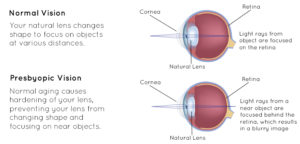Why am I struggling to focus when reading? Introducing presbyopia.

Are you having increasing difficulty focusing on books, magazines, or digital screens? Perhaps you find yourself holding newspapers or restaurant menus further away from your face in order to see small print clearly? If this sounds familiar and you are around the age of 40, then your vision issues may be due to presbyopia.

What is Presbyopia?
Presbyopia is age-related near vision loss that results in difficulty seeing up close. It is not a disease, but rather a progressive vision condition that occurs as a natural result of aging. At first, you may just notice your eyes feeling tired or strained when reading. Then you may begin to hold things further away from your face. If you are nearsighted, you may find yourself removing your regular glasses in order to read. Over time though, presbyopia is the reason that people over a certain age often find themselves reaching for reading glasses or bifocals.

Stay Informed with Presbyoptia News in Your Inbox
What Causes Presbyopia?
Presbyopia happens because a gradual change in size and loss of elasticity in the eye’s natural lens causes an issue with refraction within the eye. Refraction refers to the way in which light passes through the cornea on the front of the eye to the retina in the back of the eye. When you are young, the lens of the eye is flexible, allowing light to focus on the back of the retina to adjust to see objects at all distances. After the age of 40, your lens stiffens, making it more difficult to refract light to read small print or focus on up-close tasks.


Who Gets Presbyopia?
Everyone is at risk of developing presbyopia once they reach their late 30’s. Presbyopia is universal across genders, ethnicities, and other demographics. In fact, everyone will eventually experience some degree of presbyopia. People will experience the loss of near vision at different rates which can cause some to notice it earlier than others, and that is why some people do not seek out presbyopia treatment until their 50’s or later.
How Do I Know if I Have Presbyopia?
If you suspect you have presbyopia, you should see an experienced ophthalmologist to confirm the diagnosis and monitor your eye health. Your eye doctor can recommend treatments to help you improve your vision.
Symptoms of Presbyopia
 Trusted Source
Presbyopia, What Is It?
Harvard Health Publishing
Go to Source
4
Trusted Source
Presbyopia, What Is It?
Harvard Health Publishing
Go to Source
4
-
Books, magazines, newspapers, and electronics must be held further away in order to focus.
-
Words and details are blurry at distances at which you used to be able to see clearly
-
You increase light to gain a slight improvement in focus
-
You notice eye strain earlier than you used to when reading or performing up-close tasks
-
You feel tired or suffer headaches after reading or working on things at a close distance
 Sources
Sources
1 All About Vision. Presbyopia And Treatments FAQ. https://www.allaboutvision.com/faq/presbyopia.htm. Accessed July 31 2019
2 American Refractive Surgery Council. Presbyopia: Everything You Need To Know. https://americanrefractivesurgerycouncil.org/presbyopia-everything-you-need-to-know/ Accessed July 31 2019.
3 American Academy of Ophthalmology. What Causes Presbyopia?. https://www.aao.org/eye-health/diseases/what-is-presbyopia. Accessed July 22, 2022.
4 Harvard Health Publishing. Presbyopia, What Is It? https://www.health.harvard.edu/a_to_z/presbyopia-a-to-z Accessed July 31, 2019.




